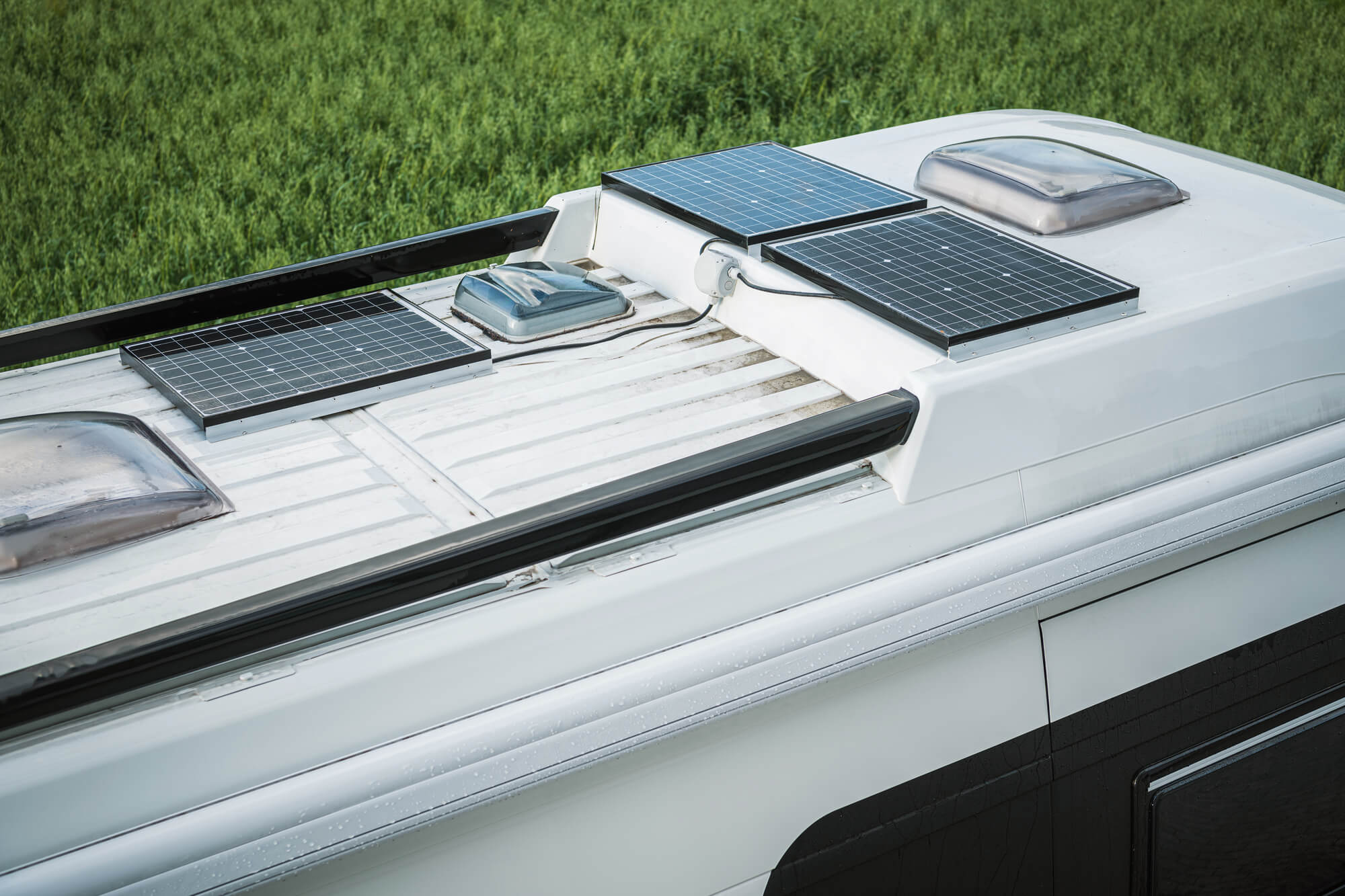
The world of Recreational Vehicles is evolving as the demand for sustainability and energy efficiency grows. Electric RVs are emerging as an alternative to traditional gas-powered motorhomes, offering reduced emissions, quieter rides, and innovative power systems. But are they practical for long-term travel?
Let’s answer the question and explore the benefits, challenges, available models, and future prospects of electric RVs while covering key aspects like solar panels, charging infrastructure, and battery systems.
What Are Electric RVs?
An electric RV is a motorhome, campervan, or electric travel trailer powered primarily by battery systems rather than an internal combustion engine. These electric vehicles (EVs) reduce dependence on fossil fuels while integrating advanced power supply solutions like solar panels and shore power cords.
Different Types of Electrified RVs
With the technology still being relatively new, it’s worth making what we’re referring to when we mention “electric RVs” clearer. The term includes fully electric RVs, which fully run on electrical power, and then, more broadly, self-powered electric travel trailers, and in some instances, can refer to hybrid RVs, which mix traditional internal combustion engines with battery-power motors.
To recap, these are three main types of electric camping experiences currently available on the market:
- Fully Electric RVs: Powered entirely by battery power and require external power sources for recharging.
- Plug-in Hybrid RVs: Combine battery life with a small combustion engine for extended range.
- Self-Powered Electric Travel Trailers: Feature independent battery voltage and electric power for easier towing with an electric tow vehicle.
The Benefits of Electric RVs
As more travelers seek eco-friendly options for their adventures, electric RVs are becoming increasingly popular. These vehicles not only reduce emissions but also offer a unique combination of cost-effectiveness, serenity during travel, and advanced technology.
Below, we explore the primary benefits that make electric RVs a compelling choice for the modern adventurer.
Environmental Benefits
- Zero Tailpipe Emissions: Electric RVs produce no tailpipe emissions, significantly reducing their carbon footprint compared to traditional gas-powered vehicles.
- Sustainable Alternative: They serve as a more sustainable option to conventional camper vans and motorhomes, aligning with the growing interest in greener travel solutions.
Cost Savings Over Time
- Eliminates Fuel Expenses: Electric RVs remove the need for gasoline or diesel tow vehicles, allowing owners to save significantly on fuel costs over time.
- Lower Vehicle Maintenance: With fewer moving parts in electric powertrains, maintenance is generally less frequent and less costly. Additionally, dead batteries can be replaced more easily than with traditional vehicles.
- Reduced Wear on Brake Systems: The use of regenerative braking helps extend the life of brake components, resulting in lower repair costs.
A Quieter and Smoother Ride
- Silent Operation: Electric campers utilize low-frequency inverters, leading to exceptionally quiet travel experiences, which can enhance relaxation and enjoyment.
- Peaceful Camping Environments: With no engine noise, travelers can stop in serene camping spots without disturbing the peace of nature.
Technological Advancements
- Smart Electrical Systems: Many electric RVs come equipped with advanced electrical systems that intelligently manage power consumption to enhance efficiency.
- Solar Integration: Many models feature solar panels that can reduce dependence on campground power sources, allowing for off-grid adventures.
- Optimized Power Distribution: An inverter with bypass functions helps efficiently manage and distribute AC power where it’s needed most, improving overall energy use
As technology continues to evolve, it’s clear that electric RVs offer numerous advantages, making them a worthwhile consideration for anyone passionate about sustainable travel.
How Do Electric RV Batteries Work?
Electric RVs rely on high-power battery systems for propulsion and onboard electrical appliances. The most common batteries include lithium-ion, lead-acid batteries, and developing solid-state batteries.
Range Expectations for Electric RVs
- Current models average 100-300 miles per charge, with improvements expected.
- Weather, terrain, speed, and towing weight all impact range.
- Innovations like Winnebago Connect aim to improve battery life.
Can Solar Panels Help Extend Battery Life?
Solar power serves as an essential supplement to battery systems, particularly for off-grid travel, where traditional power sources may be unavailable. This integration allows electric RVs to maximize their energy efficiency and minimize reliance on external charging stations.
A common setup includes 120-volt AC power inverters, which convert DC power stored in batteries into usable AC power for various devices and appliances found in RVs.
Additionally, LED lights are often utilized due to their energy-efficient nature, providing illumination without draining the battery quickly. This combination of solar power and modern energy management solutions makes electric RVs well-suited for running high-power appliances, such as air conditioning units and water heaters, enabling travelers to maintain a comfortable living environment while exploring remote locations.

Charging an Electric RV: What You Need to Know
Few aspects are as crucial to the future of electric vehicles, whether they’re cars or RVs, than how easy and convenient it is to charge them.
As the popularity of electric RVs grows, understanding the available charging options becomes essential for ensuring seamless travel experiences. With various methods of recharging, it is increasingly easy to power your electric RV, allowing you to enjoy the open road without the hassle of running out of energy.
Here is a breakdown of the different charging options available and considerations for RV travelers.
Types of Charging Options
- Level 1 Charging: This basic charging option utilizes a standard 120-volt household power outlet through a common power cord. While this is the slowest method of charging, it can be sufficient for overnight stays at home or campsites where you have access to electricity.
- Level 2 Charging: For faster energy replenishment, Level 2 charging systems use a 30-amp breaking panel dedicated cord typically found at campgrounds. This provides a quicker charging experience compared to Level 1, allowing you to spend less time plugged in and more time enjoying your adventure.
- DC Fast Charging: If you’re looking for the quickest option available, DC fast charger units deliver a high-powered burst of energy to your electric RV. These stations can significantly shorten the time it takes to recharge compared to Level 1 and Level 2 options, making them ideal for road trips where time is of the essence.
Charging Infrastructure for RV Travelers
While the charging infrastructure for electric RVs is developing, it’s essential to note that many campgrounds still lack robust electrical connections for these vehicles. The demand for more charging options has led to the expansion of external power sources, such as those developed by Winnebago Industries.
However, it’s vital for RV travelers to recognize a growing need for closed-circuit charging networks to ensure that electric RVs can conveniently access power while on the road.
Solar Panels as an Alternative Power Source
Using solar panels provides an effective alternative to traditional shore power connections, significantly reducing reliance on external power sources. By harnessing solar energy, electric RV owners can power essential appliances, air conditioning units, and 12-volt DC power systems during their travels.
Leading brands, such as Lightship RVs and Airstream, have integrated solar options into their designs, making it easier than ever to go off-grid. This eco-friendly solution not only helps in maintaining energy independence but also promotes sustainable travel practices.
Electric RVs on the Market Today
Exactly what options are even available to consumers already? While not as robust as the EV variety available in the private automobile market, there are a couple of options now available in the camping experience in both the North American and European markets. However, Europe has a bit of a head start on the American EV market in this regard.
Current Electric RV Models Available for Purchase
- Iridium E-Mobil RV (Germany): European electric camper.
- Volkswagen ID. Buzz Electric Minivan: Compact and efficient.
- Nissan e-NV200 Electric Camper: UK-based electric travel trailer.
- Mercedes EQV Campervan by Tonke: A luxury camper conversion.
Upcoming Electric RVs: What’s Coming Soon?
While not yet available as of 2025, some of the biggest American brands in recreational vehicles have already promised to release their own EV RVs to consumers soon. They include big names like:
- Winnebago eRV2: Features advanced battery voltage wire systems.
- Airstream eStream: An innovative electric travel trailer with solar power for extra sources of power to run most living and kitchen appliances, along with a high-voltage battery pack.
- THOR Vision Vehicle: High-tech EV motorhome concept.
Towable Electric Travel Trailers: The Next Big Thing?
As we discussed at the beginning, the world of Electric RVs encompasses much more than just electric motorhomes or campers; it also includes a variety of innovative developments in towable travel trailers.
What Are Electric Travel Trailers?
Self-powered electric trailers are designed to significantly reduce the burden on the tow vehicles that transport them.
These trailers come equipped with specialized circuit breakers and breaker panels, which promote efficient energy consumption and allow for optimal use of power resources.
These advanced electric trailers not only possess ample battery capacity to operate their electrical systems independently, without relying on the power of a generator or the towing vehicle, but many can also have the capability to charge an electric vehicle (EV) that is being towed.
Available and Upcoming Models
One exciting example of innovation in this category is the Lightship L1, which is recognized as the first all-electric travel trailer available on the market and was launched in 2023.
Additionally, there are future models in development that will incorporate sophisticated technologies to provide improved access to renewable and alternative sources of energy, enhancing the sustainability and efficiency of travel experiences.
Price Range for Electric RVs
Electric RVs come in a wide spectrum of prices, ranging from more affordable entry-level models to high-end luxury options that cater to those seeking comfort and advanced features. It’s important to analyze the pricing of these all-electric vehicles and see how they stack up against traditional diesel and gas-powered RVs that have dominated the market for years.
Cost of Electric Towable Travel Trailers
When considering electric options, it’s essential to examine the various price points of self-powered electric trailers. These innovative trailers offer flexibility and efficiency, making them a great alternative for travelers looking to reduce their carbon footprint without sacrificing comfort.
Total Cost of Ownership: Are Electric RVs More Affordable Over Time?
Evaluating the overall cost of ownership is crucial—electric RVs can offer significant savings over time, especially with regard to camping trips that eliminate fuel costs.
Additionally, owners may experience lower vehicle maintenance expenses, primarily due to fewer issues related to dead batteries and the reduced need for lead-acid battery replacements, which can be pricey and inconvenient.
Nonetheless, these comparisons have to be thorough, and this is still a new market with the potential for many unexpected costs in a few years.
The Future of Electric RVs: Where Is the Industry Headed?
Growth Projections for the Electric RV Market
The expansion of the electric vehicle (EV) lineup by Winnebago Industries and other brands signifies a significant trend in the market. As more manufacturers recognize the growing demand for electric recreational vehicles, we can expect to see an increase in diverse models and designs that cater to various consumer preferences and requirements.
Potential Breakthroughs in Battery Technology
Innovations in battery technology are on the horizon, particularly with the development of solid-state batteries. These advancements promise to deliver extended kilowatt-hour (kWh) electricity capabilities, which can greatly enhance the range and efficiency of electric RVs, making them a more viable option for many outdoor enthusiasts.
Challenges Facing the Widespread Adoption of Electric RVs
The future of all-electric vehicles looks bright, with many countries already well on their way to completely replacing internal combustion engines with electric ones by the next decade. However, the EV infrastructure in many countries, including the U.S., still has some way to go before we can say definitively that electric RVs are the absolute best option for consumers.
The EV future for recreational vehicles has some challenges, including:
- Limited Range Compared to Gas-Powered RVs: Need for improved charge circuits and additional battery power beyond the current 12-volt battery power standard, and even provide alternative sources of energy.
- Charging Infrastructure Gaps: Limited campground power sources and expansion of unlimited access to charging networks are needed.
- Higher Initial Purchase Price: In a fight between current pricing vs. traditional motorhomes, traditional gasoline and diesel vehicles will still beat electrical. Consumers will still need to weigh the potential cost of ownership savings via reduced electrical system repairs.
Final Thoughts: Are Electric RVs the Future of Road Travel?
Electric RVs are on the rise, integrating solar panels, shore power cords, and advanced electrical connections. While challenges like charging infrastructure and battery systems remain, the market is shifting toward sustainability.
If you’re ready to embrace the electric RV lifestyle, Southeast Financial offers flexible RV loans to help you finance your dream electric camper. Contact us today to explore financing options for your next adventure!


